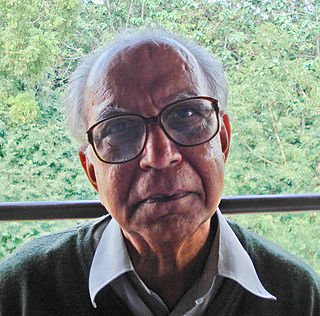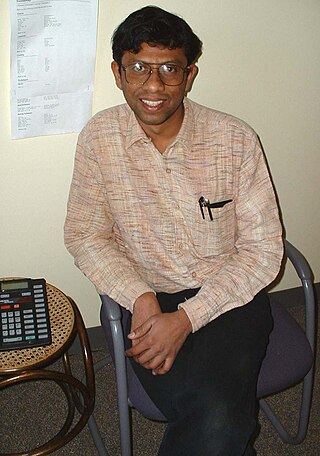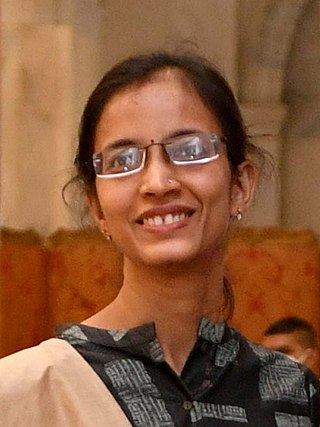Related Research Articles

Shiraz Naval Minwalla is an Indian theoretical physicist and string theorist. He is a faculty member in the Department of Theoretical Physics at Tata Institute of Fundamental Research, Mumbai. Prior to his present position, Minwalla was a Harvard Junior Fellow and subsequently an assistant professor at Harvard University.

Tata Institute of Fundamental Research (TIFR) is an Indian Research Institute under the Department of Atomic Energy of the Government of India. It is a public deemed university located at Navy Nagar, Colaba in Mumbai. It also has a campus in Bangalore, International Centre for Theoretical Sciences (ICTS), and an affiliated campus in Serilingampally near Hyderabad. TIFR conducts research primarily in the natural sciences, the biological sciences and theoretical computer science.

Mudumbai Seshachalu NarasimhanFRS was an Indian mathematician. His focus areas included number theory, algebraic geometry, representation theory, and partial differential equations. He was a pioneer in the study of moduli spaces of holomorphic vector bundles on projective varieties. His work is considered the foundation for Kobayashi–Hitchin correspondence that links differential geometry and algebraic geometry of vector bundles over complex manifolds. He was also known for his collaboration with mathematician C. S. Seshadri, for their proof of the Narasimhan–Seshadri theorem which proved the necessary conditions for stable vector bundles on a Riemann surface.

Rajesh Gopakumar is an Indian theoretical physicist and the director of the International Centre for Theoretical Sciences in Bangalore, India. He was previously a professor at Harish-Chandra Research Institute (HRI) in Prayagraj, India. He is known for his work on topological string theory.
Srinivasacharya Raghavan was an Indian mathematician who worked in number theory. He was born on 11 April 1934 in Thillaisthanam, Thanjavur, Tamil Nadu. After completing B.A. (Hons) from St. Joseph's College, Tiruchirapalli, he joined TIFR in 1954 as research student, and completed his Ph.D. in 1960 under the supervision of Professors K. Chandrasekharan and K.G. Ramanathan. He was affiliated with TIFR from 1956 until retirement in 1994, and served as Dean of Mathematics Faculty during 1986–89. He played an important role in the development of the TIFR Centre for Applicable Mathematics at Bangalore in its initial years. He also held visiting appointments at the Institute for Advanced Study, Princeton, USA, Sonderforschungsberiech at University of Goettingen, Germany, SPIC Mathematical Institute and taught at the Centre for Advanced Studies in Mathematics at the University of Mumbai for many years.
Sundararaman Ramanan is an Indian mathematician who works in the area of algebraic geometry, moduli spaces and Lie groups. He is one of India's leading mathematicians and recognised as an expert in algebraic geometry, especially in the area of moduli problems. He has also worked in differential geometry: his joint paper with MS Narasimhan on universal connections has been influential. It enabled SS Chern and B Simons to introduce what is known as the Chern-Simons invariant, which has proved useful in theoretical physics.

Ganapathy Baskaran is an Indian theoretical physicist, known for his work on condensed matter physics and strongly correlated quantum materials. Baskaran is an Emeritus Professor of physics at the Institute of Mathematical Sciences in Chennai, India and holds a Distinguished Visiting Research Chair at the Perimeter Institute for Theoretical Physics in Waterloo, Canada. Recently he became a Distinguished Professor at the Indian Institute of Technology, Madras (Chennai), India.
Tarlok Nath Shorey is an Indian mathematician who specialises in theory of numbers. He is currently a distinguished professor in the department of mathematics at IIT Bombay. Previously, he worked at TIFR.
Trivandrum Ramakrishnan "T. R." Ramadas is an Indian mathematician who specializes in algebraic and differential geometry, and mathematical physics. He was awarded the Shanti Swarup Bhatnagar Prize for Science and Technology in 1998, the highest science award in India, in the mathematical sciences category.

Kapil Hari Paranjape is an Indian mathematician specializing in algebraic geometry. He is a Professor of Mathematics at the Indian Institute of Science Education and Research, Mohali.
Amol Dighe is a Professor of Physics in Tata Institute of Fundamental Research, Mumbai, India. He studied in Saraswati Secondary School, Thane, Maharashtra up to 10th grade and attended D. G. Ruparel College for the next 2 years. He was awarded the Shanti Swarup Bhatnagar Prize for science and technology, the highest science award in India, for the year 2013 in physical science category. His main research interest is in the area of high energy physics with focus on particles known as neutrinos, their nature and the role they play in astrophysics and cosmology. Dighe completed his BTech in Engineering Physics (1992) from Indian Institute of Technology, Bombay, MS and PhD (1997) from University of Chicago. Later he did postdoctoral research at ICTP, Trieste, CERN and Max Planck Institute before joining TIFR as a faculty member in 2003. He is a fellow the Indian Academy of Sciences and has won the Swarnajayanti Fellowship from the Department of Science and Technology, Government of India.
Abhishek Dhar is an Indian physicist specialising in statistical physics and condensed matter physics. He is a Professor in the International Centre for Theoretical Sciences, Bangalore.

Ritabrata Munshi is an Indian mathematician specialising in number theory. He was awarded the Shanti Swarup Bhatnagar Prize for Science and Technology, the highest science award in India, for the year 2015 in mathematical science category.
Aninda Sinha is an Indian theoretical physicist working as a professor at Center for High Energy Physics, Indian Institute of Science in Bangalore, India.

Neena Gupta is a professor at the Statistics and Mathematics Unit of the Indian Statistical Institute (ISI), Kolkata. Her primary fields of interest are commutative algebra and affine algebraic geometry.
Vivek Shripad Borkar is an Indian electrical engineer, mathematician and an Institute chair professor at the Indian Institute of Technology, Mumbai. He is known for introducing analytical paradigm in stochastic optimal control processes and is an elected fellow of all the three major Indian science academies viz. the Indian Academy of Sciences, Indian National Science Academy and the National Academy of Sciences, India. He also holds elected fellowships of The World Academy of Sciences, Institute of Electrical and Electronics Engineers, Indian National Academy of Engineering and the American Mathematical Society. The Council of Scientific and Industrial Research, the apex agency of the Government of India for scientific research, awarded him the Shanti Swarup Bhatnagar Prize for Science and Technology, one of the highest Indian science awards for his contributions to Engineering Sciences in 1992. He received the TWAS Prize of the World Academy of Sciences in 2009.
Deepak Dhar is an Indian theoretical physicist known for his research on statistical physics and stochastic processes. In 2022, he became the first Indian to be awarded the Boltzmann Medal, the highest recognition in statistical physics awarded once every three years by IUPAP, for exceptional contributions to the subject.
Arun Mallojirao Jayannavar was an Indian condensed matter physicist and a senior professor at the Institute of Physics, Bhubaneswar. Known for his research on many interdisciplinary areas of condensed matter physics, Jayannavar was an elected fellow of all the three major Indian science academies viz. Indian Academy of Sciences, National Academy of Sciences, India and Indian National Science Academy. The Council of Scientific and Industrial Research, the apex agency of the government of India for scientific research, awarded Jayannavar the Shanti Swarup Bhatnagar Prize for Science and Technology, one of the highest Indian science awards, for his contributions to physical sciences in 1998.
Mohit Randeria is a US-based Indian condensed matter physicist and a professor of physics at Ohio State University. Known for his research on condensed matter theory and superconductivity, Randeria is an elected fellow of the American Physics Society. The Council of Scientific and Industrial Research, the apex agency of the Government of India for scientific research, awarded him the Shanti Swarup Bhatnagar Prize for Science and Technology, one of the highest Indian science awards, for his contributions to physical sciences in 2002. He was awarded the 2002 ICTP Prize of the International Center for Theoretical Physics, Trieste and the 2022 John Bardeen Prize.

Atish Dabholkar is an Indian theoretical physicist. He is currently the Director of the Abdus Salam International Centre for Theoretical Physics (ICTP) with the rank of Assistant Director-General, UNESCO. Prior to that, he was head of ICTP's High Energy, Cosmology and Astroparticle Physics section, and also Directeur de Recherche at the Centre National de la Recherche Scientifique (CNRS) at Sorbonne University in the "Laboratoire de Physique Théorique et Hautes Énergies" (LPTHE).
References
- ↑ "Amalendu Krishna | Department of Mathematics - UC Santa Barbara". www.math.ucsb.edu. Retrieved 27 August 2024.
- ↑ "Faculty". School of Mathematics, TIFR. Retrieved 26 November 2016.
- ↑ "Brief Profile of the Awardee". Shanti Swarup Bhatnagar Prize. Retrieved 26 November 2016.
- 1 2 B . Sandhya Rani (25 October 2015). "In Conversation : Amalendu Krishna" (PDF). Current Science. 109 (8): 1384–1385. Retrieved 26 November 2016.
- ↑ "Ramanujan Prize Winner 2015". The Abdus Salam International Center for Theoretical Physics. Archived from the original on 5 November 2016. Retrieved 26 November 2016.
- ↑ Manjil Saikia. "Amalendu Krishna and Naveen Garg awarded the 2016 Shanti Swarup Bhatnagar Prize for Mathematical Sciences". Gonit Sora.
{{cite web}}: Missing or empty|url=(help)